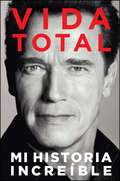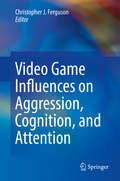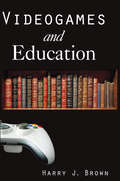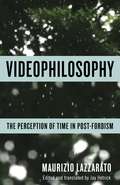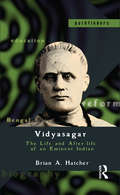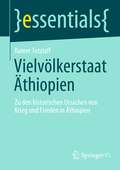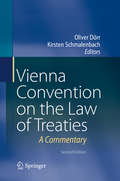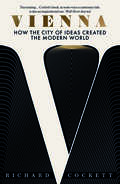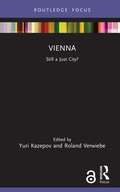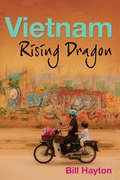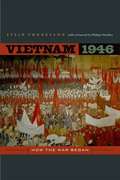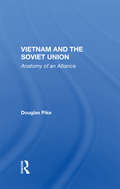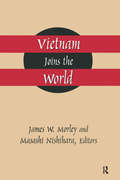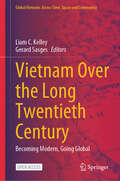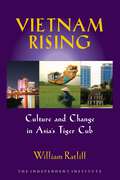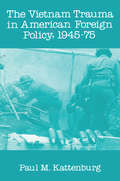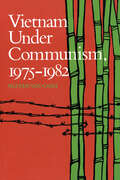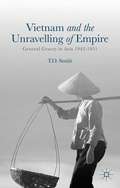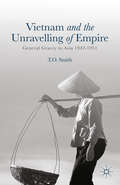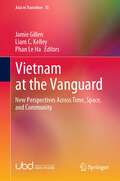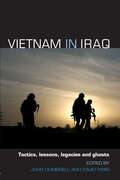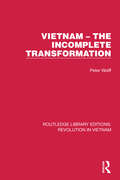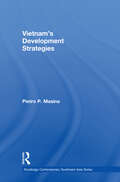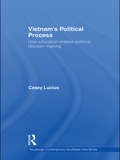- Table View
- List View
Vida Total: Mi Historia Increíble
by Arnold SchwarzeneggerLA MEJOR HISTORIA DE INMIGRACIÓN DE NUESTROS TIEMPOSSu historia es única, divertida, y en estas páginas la cuenta de manera brillante. Nació durante un año de hambruna en un pequeño pueblo de Austria, hijo de un jefe de policía muy austero. Soñaba con mudarse a los Estados Unidos para convertirse en campeón del fisiculturismo y estrella de cine. A los veintiún años vivía en Los Ángeles y ya había sido coronado como Mr. Universo. Cinco años más tarde había aprendido a hablar inglés y se había convertido en el mejor fisiculturista del mundo. Diez años más tarde había completado su título universitario y se había vuelto millonario gracias a sus empresas comerciales en el sector inmobiliario, el paisajismo y el fisiculturismo. También había ganado un Golden Globe por su debut como actor dramático en Stay Hungry. Veinte años más tarde era la estrella de cine más famosa del mundo, estaba casado con Maria Shriver y era un líder republicano emergente que formaba parte de la familia Kennedy. Treinta y seis años después de haber llegado a los Estados Unidos, el hombre que alguna vez fue conocido entre sus compañeros fisiculturistas como el "roble austriaco" fue elegido como gobernador de California, la séptima economía más grande del mundo. Gobernó el estado a lo largo de una crisis presupuestaria, desastres naturales y disturbios políticos, trabajando con ambos lados del espectro político para crear un mejor ambiente, reformas electorales y soluciones bipartidistas. Con Maria Shriver crió a cuatro hijos fantásticos. En medio del escándalo que él mismo creó, intentó mantener a su familia unida. Hasta ahora nunca ha contado la historia completa de su vida, en su propia voz. Éste es Arnold. Ésta es su vida total.
Video Game Influences on Aggression, Cognition, and Attention
by Christopher J. FergusonThis book addresses the ongoing scientific debates regarding video games and their effects on players. The book features opposing perspectives and offers point and counterpoint exchanges in which researchers on both sides of a specific topic make their best case for their findings and analysis. Chapters cover both positive and negative effects of video games on players’ behavior and cognition, from contributing to violence and alienation to promoting therapeutic outcomes for types of cognitive dysfunction. The contrasting viewpoints model presents respectful scientific debate, encourages open dialogue, and allows readers to come to informed conclusions. Key questions addressed include: · Do violent video games promote violence? · Does video game addiction exist? · Should parents limit children’s use of interactive media? · Do action video games promote visual attention? · Does sexist content in video games promote misogyny in real life? · Can video games slow the progress of dementia? · Are video games socially isolating?Video Game Influences on Aggression, Cognition, and Attention is a must-have resource for researchers, clinicians and professionals as well as graduate students in developmental psychology, social work, educational policy and politics, criminology/criminal justice, child and school psychology, sociology, media law, and other related disciplines.
Videogames and Education (History, The Humanities And New Technology Ser.)
by Harry J. BrownVideo games challenge our notions of identity, creativity, and moral value, and provide a powerful new avenue for teaching and learning. This book is a rich and provocative guide to the role of interactive media in cultural learning. It searches for specific ways to interpret video games in the context of human experience and in the field of humanities research. The author shows how video games have become a powerful form of political, ethical, and religious discourse, and how they have already influenced the way we teach, learn, and create. He discusses the major trends in game design, the public controversies surrounding video games, and the predominant critical positions in game criticism. The book speaks to all educators, scholars, and thinking persons who seek a fuller understanding of this significant and video games cultural phenomenon.
Videophilosophy: The Perception of Time in Post-Fordism (Columbia Themes in Philosophy, Social Criticism, and the Arts)
by Maurizio LazzaratoThe Italian philosopher Maurizio Lazzarato has earned international acclaim for his analysis of contemporary capitalism, in particular his influential concept of immaterial labor and his perceptive writings on debt. In Videophilosophy, he reveals the underpinnings of contemporary subjectivity in the aesthetics and politics of mass media. First written in French and published in Italian and later revised but never published in full, this book discloses the conceptual groundwork of Lazzarato’s thought as a whole for a time when his writings have become increasingly influential.Drawing on Bergson, Nietzsche, Benjamin, Deleuze and Guattari, and the film theory and practice of Dziga Vertov, Lazzarato constructs a new philosophy of media that ties political economy to the politics of aesthetics. Through his concept of “machines that crystallize time,” he argues that the proliferation of digital technologies over the past half-century marks the transition to a new mode of capitalist production characterized by unprecedented forms of subjection. This new era of the commodification of the self, Lazzarato declares, demands novel types of political action that challenge the commercialization and exploitation of time. This crucial text by an essential contemporary thinker offers vital new perspectives on aesthetics, politics, and media and critical theory.
Vidyasagar: The Life and After-life of an Eminent Indian (Pathfinders)
by Brian A. HatcherThis book offers a new interpretation of the life and legacy of the Indian reformer and intellectual, Ishvarchandra Vidyasagar (1820–91). Drawing upon autobiography, biography, secondary criticism and a range of Vidyasagar’s original writings in Bengali, the book interrogates the role of history, memory and controversy, and emphasises the key challenge of pinning down the identity of an enigmatic and multi-faceted figure. By examining lesser-known works of Vidyasagar (including several pseudonymous and posthumous works) alongside the evidence of his public career, the author calls attention to the colonial transformation of intellectual and social life, the nature of life writing, the limits of standard biographies and the problem of modern Indian identity as such. Based on decades of research and an original perspective, this book will be especially useful to scholars of modern Indian history, biographical studies, comparative literature and those interested in Bengal.
Vielfalt in der öffentlichen Verwaltung: Strategien und Konzepte für ein wirksames Diversity Management in Kommunen, Ländern und Bund
by John Meister Matthias HörmeyerDieses Buch zeigt, wie Diversity Management in der öffentlichen Verwaltung gelingt und Vielfalt in Kommunen, Ländern und Bund erfolgreich gefördert wird. Die öffentliche Verwaltung steht vor zahlreichen Herausforderungen: Demografischer Wandel, Arbeitskräftemangel, Klimawandel, Digitalisierung, Krisenbewältigungen, veränderte Ansprüche der Gesellschaft. Eine zeitgemäße Antwort darauf ist Diversity Management. Mit Diversity kann sich die öffentliche Verwaltung zukunftsorientiert verändern. Sie kann attraktive Arbeitgeberin sein, empathischer auf die Bedürfnisse der Bürger*innen eingehen und den Herausforderungen der Zukunft besser begegnen. Renommierte Fachbeitragsautor*innen zeigen, dass Diversity wichtige Bausteine liefert, um die erforderliche Handlungsfähigkeit der öffentlichen Verwaltung nachhaltig zu sichern. Dazu werden vielfältige Konzepte, Ideen, Praxisbeispiele und Erfahrungsberichte vorgestellt, wie die öffentliche Verwaltung neue und innovative Wege gehen kann, um Diversity Management erfolgreich umzusetzen.Mit Beiträgen von: Paula Lina AuksutatSarina BadafrasBelma BekosCigdem BernIsabel CollienSonja DudekIrina EckardtDr. Klaus EffingStefan Fuerst Julia GöpelProf. Dr. Regine GramlAna-Cristina GrohnertMarc GroßInes HansenTessa HillermannMatthias Hörmeyer (Hrsg.)Hans W. JablonskiKathleen JägerJana JanzePeter JanzeJan KlumbIbrahim KöranAnika KrellmannEdwin MeierJohn Meister (Hrsg.)Sabine MeisterBaris ÖnesZehra ÖztürkMelanie PetersonMaria PozderGabriel RathMeike ReuterAlice RittgerodtMagdalena RoglJochen SchiffmannRouven-Alexander SlabikMagdalena WeißGülcan Yoksulabakan-ÜstüayChristian Zierau
Vielvölkerstaat Äthiopien: Zu den historischen Ursachen von Krieg und Frieden in Äthiopien (essentials)
by Rainer TetzlaffDas Essential analysiert die historischen Ursachen von Krieg und Frieden in Äthiopien im Kontext von Reichsgründung und Modernisierung seit der Mitte des 19. Jahrhunderts. Es stellt die aktuellen Rivalitäten zwischen den Völkern der Tigray, Eritreer, Amharen und Oromo seit der Abschaffung der Monarchie 1974 in den Vordergrund und diskutiert die politischen Aussichten auf Frieden und interethnische Versöhnung unter der Herrschaft des amtierenden Premierministers Abiy Ahmed – Friedensnobelpreisträger und Kriegsherr zugleich.
Vienna Convention on the Law of Treaties
by Oliver Dörr Kirsten SchmalenbachThe Commentary on the Vienna Convention on the Law of Treaties provides an in-depth article-by-article analysis of all provisions of the Vienna Convention. The texts are uniformly structured: (I) Purpose and Function of the Article, (II) Historical Background and Negotiating History, and (III) Elements of the Article. The Vienna Convention on Treaties between States and IOs and between IOs is taken into account where appropriate. In sum, the present Commentary contains a comprehensive legal analysis of all aspects of the international law of treaties. Where the law of treaties reaches into other fields of international law, e. g. the law of state responsibility, the relevant interfaces are discussed and contextualized. With its focus on international practice, the Commentary is addressed to academia, as well as to practitioners of international law.
Vienna: How the City of Ideas Created the Modern World
by Richard CockettHow can one European capital be responsible for most of the West&’s intellectual and cultural achievements in the twentieth century? Viennese ideas saturate the modern world. From California architecture to Hollywood Westerns, modern advertising to shopping malls, orgasms to gender confirmation surgery, nuclear fission to fitted kitchens—every aspect of our history, science, and culture is in some way shaped by Vienna. The city of Freud, Wittgenstein, Mahler, and Klimt was the melting pot at the heart of a vast metropolitan empire. But with the Second World War and the rise of fascism, the dazzling coteries of thinkers who squabbled, debated, and called Vienna home dispersed across the world, where their ideas continued to have profound impact. Richard Cockett gives us the entirety of this extraordinary story. Tracing Vienna&’s rich intellectual history from psychoanalysis to Reaganomics, Cockett encompasses everything from the communist rebels of Red Vienna to the neoliberal economists of the Austrian School. This is the panoramic account of how one city made the modern world—and how we all remain inescapably Viennese.
Vienna: Still a Just City? (Built Environment City Studies)
by Yuri KazepovThis book explores and debates the urban transformations that have taken place in Vienna over the past 30 years and their consequences in policy fields such as labour and housing, political and social participation and the environment. Historically, European cities have been characterised by a strong association between social cohesion, quality of life, economic ambition and a robust State. Vienna is an excellent example for that. In more recent years, however, cities were pressured to change policy principles and mechanisms in the context of demographic shifts, post-industrial transformations and welfare recalibration which have led to worsened social conditions in many cities. Each chapter in this volume discusses Vienna’s responses to these pressures in key policy arenas, looking at outcomes from the context-specific local arrangements. Against a theoretical framework debating the European city as a model of inclusion and social justice, authors explore the local capacity to innovate urban policies and to address new social risks, while paying attention to potential trade-offs. The book questions and assesses the city’s resilience using time series and an institutional analysis of four key dimensions that characterise the European city model within the context of post-industrial transition: redistribution, recognition, representation and sustainability. It offers a multiscalar perspective of urban governance through labour, housing, participatory and environmental policies, bringing together different levels and public policy types. Vienna: Still a Just City? is aimed at academics, researchers and policy-makers in urban studies, including urban sociology, ecology, geography and welfare.
Vietnam
by Bill HaytonThe eyes of the West have recently been trained on China and India, but Vietnam is rising fast among its Asian peers. A breathtaking period of social change has seen foreign investment bringing capitalism flooding into its nominally communist society, booming cities swallowing up smaller villages, and the lure of modern living tugging at the traditional networks of family and community. Yet beneath these sweeping developments lurks an authoritarian political system that complicates the nation's apparent renaissance. In this engaging work, experienced journalist Bill Hayton looks at the costs of change in Vietnam and questions whether this rising Asian power is really heading toward capitalism and democracy. Based on vivid eyewitness accounts and pertinent case studies, Hayton's book addresses a broad variety of issues in today's Vietnam, including important shifts in international relations, the growth of civil society, economic developments and challenges, and the nation's nascent democracy movement as well as its notorious internal security. His analysis of Vietnam's "police state," and its systematic mechanisms of social control, coercion, and surveillance, is fresh and particularly imperative when viewed alongside his portraits of urban and street life, cultural legacies, religion, the media, and the arts. With a firm sense of historical and cultural context, Hayton examines how these issues have emerged and where they will lead Vietnam in the next stage of its development.
Vietnam 1946: How the War Began
by Stein TonnessonBased on multiarchival research conducted over almost three decades, this landmark account tells how a few men set off a war that would lead to tragedy for millions. Stein was one of the first historians to delve into scores of secret French, British, and American political, military, and intelligence documents.
Vietnam And The Soviet Union: Anatomy Of An Alliance
by Douglas PikeExamining the long and turbulent relationship between Vietnam and the Soviet Union, Douglas Pike traces its political, economic, and diplomatic history from the Bolshevik Revolution to today's deep and intricate alliance. He not only explores this extraordinary relationship but also outlines its great geopolitical significance for the entire region
Vietnam Joins the World: American and Japanese Perspectives
by James Morley Masashi NishiharaTen American and Japanese specialists offer a comprehensive analysis of one of the most dramatic developments in Asia today: the re-emergence of Vietnam - not as the belligerent champion of a militant ideology and socialist cause, but as an open, friendly country seeking a respected place in the world community. Basing their observations on five years of study, visits to Vietnam, and numerous interviews with knowledgeable officials, scholars and businessmen there and in the United States and Japan, the authors evaluate the political, ecnomic, social and foreign policy changes that have been taking place in Vietnam over the past decade, trace the responses of the United States and Japan and offer a policy prescription for responding to the challenges of the future.
Vietnam Over the Long Twentieth Century: Becoming Modern, Going Global (Global Vietnam: Across Time, Space and Community)
by Liam C. Kelley Gerard SasgesThis open access book provides fascinating insights into the incredible changes that Vietnam underwent in the long twentieth century as it transformed from an early modern kingdom to a European colony, to a divided land with opposing ideologies, and to a unified country in a globalized world. At each stage in this long century of changes, there were Vietnamese who sought to mold their society into some vision of “modernity.” The book looks at multiple, rather than one form of modernity, and links those forms with the different political moments that Vietnam experienced, in tandem with the outside interlocutors that were maintained during those periods. As such, this book provides a holistic view of the many forms of modernity and their global links that can be found in Vietnam over the course of the long twentieth century. These multiple modernities are documented in this book, and the authors do so by bringing together the strengths of “traditional” language-based area studies scholarship with the insights that an awareness of trans-national and global perspectives provides. Relevant to historians and researchers in the broader arena of Southeast Asian studies with a particular interest in Vietnam—its journey from past to present—this book is a must-read engagement with a country that has undergone and continues to experience, rapid transformation.
Vietnam Rising: Culture and Change in Asia's Tiger Cub
by William RatliffFrom Vietnam&’s acceptance into the World Trade Organization to its post-Vietnam War reform and socialist ideals, this overview concisely examines the cultural, political, and economic changes currently at work in Vietnam within a historical context and then discusses the effects such changes have had on businessmen and entrepreneurs.Vietnam is credited with having one of the &“most successful antipoverty campaigns ever undertaken anywhere, raising up about two-thirds of those who lived in poverty two decades ago, by combating both the anti-productive aspects of tradition and the needless poverty still imposed to some degree by the dead economic hand of Ho Chi Minh and his followers.&” A country that experienced chronic, centrally imposed food shortages for decades has radically changed course, greatly reduced the percentage of the population living in poverty, from over 70 percent in the mid-1980s to 14.7 percent in 2007. Except for China, Vietnam has had the fastest growing economy in all of Southeast Asia. In Vietnam Rising, William Ratliff, one of the leading experts on the economics of Southeast Asian countries, examines the remarkable, pro-market, pro-entrepreneurial changes underway in Vietnam. Ratliff then reviews the cultural and historical experiences that provide the foundation for current pro-enterprise reforms, discusses the changes that followed &“reunification&” at the end of the Vietnam War, and the reforms that began twenty years ago. In the process, Vietnam Rising illuminates the hows and whys of entrepreneurial opportunities and the changes necessary to address the remaining traditional and institutional challenges for creating a truly open, market-based, entrepreneurial climate
Vietnam Trauma in American Foreign Policy: 1945-75
by Alan R. BealsThis study of ten fateful decisions made on Indochina between 1961-75 highlights the ascent of the civilian militarists and of strategy over diplomacy in United States policymaking and reveals the inexorably interlinked and escalating character of the decisions and the central purpose of American presidents: not to have to face the expected domestic political consequences of defeat in Indochina. As a result, we were led into a prolonged stalemate in which "acting" and the management of programs became a more important preoccupation than thinking about our purposes and values, in which analysis become wholly subjective and therefore defective, and in which decision-making occurred in a closed system which did not allow for divergent inputs.
Vietnam Under Communism, 1975–1982
by Nguyen Van CanhBased on his own experiences, extensive use of primary and secondary sources, and interviews with Vietnamese refugees who lived under the new order, Nguyen Van Canh analyzes the contemporary political and administrative structure of Vietnam and its leaders, culture, education, economy, and foreign policy.
Vietnam and the Unravelling of Empire: General Gracey in Asia 1942-1951
by T. O. SmithThe Vietnam War and Indian independence devastated British policy towards Asia. The Labour Government failed to understand its commitments. Yet some senior British officers were prepared to work alongside Asian nationalism in order to secure British interests. This created a radical local fusion of imperial, diplomatic and humanitarian policies.
Vietnam and the Unravelling of Empire: General Gracey in Asia 1942-1951
by T. SmithThe Vietnam War and Indian independence devastated British policy towards Asia. The Labour Government failed to understand its commitments. Yet some senior British officers were prepared to work alongside Asian nationalism in order to secure British interests. This created a radical local fusion of imperial, diplomatic and humanitarian policies.
Vietnam at the Vanguard: New Perspectives Across Time, Space, and Community (Asia in Transition #15)
by Le Ha Phan Jamie Gillen Liam C. KelleyThis transdisciplinary edited book explores new developments and perspectives on global Vietnam, touching on aspects of history, identity, transnational mobilities, heritage, belonging, civil society, linguistics, education, ethnicity, and worship practices. Derived from the Engaging With Vietnam: An Interdisciplinary Dialogue conference series, this cutting-edge collection presents new scholarship and also represents new ways of knowing global Vietnam. Over the past 10 years, knowledge production about Vietnam has diversified in various ways as globalization, the internationalization of higher education, and the digital revolution have transformed the world, as well as Vietnam. Whereas as late as a decade ago, knowledge about Vietnam was still largely the preserve of scholars in Vietnam and a coterie of related experts outside of the country at a select few universities, today we find scholars working on Vietnam in myriad contexts. This transformation has introduced new voices and new perspectives, which this book champions. A critical text engaging a range of historical and contemporary debates about Vietnam, this book is an indispensable volume for the Southeast Asian Studies student and scholar in the humanities and social sciences.
Vietnam in Iraq: Tactics, Lessons, Legacies and Ghosts (Contemporary Security Studies)
by David Ryan John DumbrellMore than most post-1970 conflicts involving US forces, the conflict in Iraq has been fought out against a background of frequently invoked memories from the era of the Vietnam War. The essays in this book offer a series of perspectives on connections and parallels between the Vietnam War and the 2003 invasion of, and conflict in, Iraq. The contributors particularly examine the impact of the Vietnam analogy on the War in Iraq, assessing the military tactical lessons learned from the Vietnam War and exploring the influence and persistence of its legacy in US politics, culture and diplomacy. The volume holds up to original interrogation some commonly held assumptions about historical analogy, and several distinguished authorities on the Vietnam War era, in particular, offer their thoughts on the value and applicability of Vietnam-Iraq parallels. If most contributions point out some obvious dissimilarities between the two eras, notably the transformed post-Cold War international environment, the similarities, particularly those relating to the problems of cultural misunderstanding, are also apparent. Vietnam in Iraq will be of great interest for all students and researchers of the Iraq War, strategic studies, international relations and American politics.
Vietnam – The Incomplete Transformation (Routledge Library Editions: Revolution in Vietnam #5)
by Peter WolffThis book, first published in 1999, analyses the history and major economic features of the Vietnamese reform process. The attempt to establish a post-reunification centrally planned economic system, a collectivised agriculture and a capital-intensive and inward-oriented industrial sector had largely failed, provoking the development of a parallel economy which turned out to be the nucleus of an emerging private sector. The book focuses on the reform of enterprises and the financial sector and gives an overall picture of the reform efforts in the areas of rural development, the social sectors and environmental policy, and assesses the further changes and reforms needed in the country.
Vietnam's Development Strategies (Routledge Contemporary Southeast Asia Series)
by Pietro MasinaTaking a developmental approach, this book critically reviews Vietnam's reform process and shows how the country’s reform agenda is still dominated by a ‘developmental orthodoxy’ inspired by a post-Washington consensus. The author argues that a wider debate is needed in order to give national policy makers the full spectrum of alternatives to support well-informed policy decisions. In particular, the book indicates that two issues central for any analysis of the Vietnamese development reform process are substantially underdeveloped in the current scientific debate: the experience of the East Asian developmental state and the question of socialism. Presenting a way of thinking about Vietnam that goes beyond the orthodox, the book sets out the various paradigms through which the Vietnamese economy can be analyzed. This is a welcome addition to the literature and will appeal to both practitioners working in the field and the academic community in Southeast Asian studies, economics and development.
Vietnam's Political Process: How education shapes political decision making (Routledge Contemporary Southeast Asia Series)
by Casey LuciusIn a system that is known for its covert political style, Vietnam’s decision making process is often described as either consensus-based or simply confusing and inexplicable. This book provides an approach to understanding political decision making in Vietnam by recognizing enduring values that are derived from State-controlled education and official historical narratives. The nation’s official historical narrative has led to the development of protected values that are called upon during political decision making. In order to secure these values, such as regime stability, national independence, and social order, officials must act within accepted rules of appropriate political behavior. The book shows that through State-run education, mandatory defense training, and membership in mass organizations, Vietnamese citizens are taught social and political ethics, and their identity is moulded in concert with this process. Using textbooks and education to understand the underlying values within Vietnam’s society is used as the contextual framework for two case studies - the problem of landmines and the on-going threat of avian influenza - which examine how authorities frame problems, negotiate, and deal with potential crises. This book will be of great interest of academics and students within Asian studies, but also for policy makers involved with the country and those doing business in Vietnam, including non-governmental organizations, private businesses and charitable groups.
